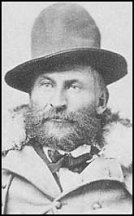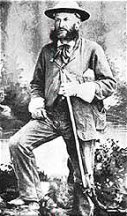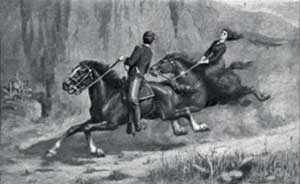 Rescue
of Miss Gracie ~ page 188
Rescue
of Miss Gracie ~ page 188
Ranger, his head high in air, the bit in his teeth, dashing blindly,
madly towards him, and Grace—Grace, hat and veil gone, her beautiful hair
streaming behind her, still firmly maintaining seat and rein, but powerless
to control the wild rush of her steed,—horse and rider came flying down
the slope, down towards the pitiless rocks and surges that lay but that
short five hundred yards away. Now, Ray, Where are you? Oh, never fear
for him! Pluck and skill and grit, coolness and nerve were never lacking
when Ray stood by. Quick as a flash he reins his horse to left about. Quick
as a flash the spurred heels strike home, and with the shout of “Go, you
scoundrel!” ringing in his startled ears, Ray’s horse springs into a charge
down the slope, leading Ranger by half a dozen lengths. Well over to the
left of the road his rider guides him, looking warily ahead and noting
with satisfaction that no boulders or heavy stones mar the track. Then,
cool and steady, he turns in the saddle and waves his hand to her with
cheery shout, “All right, Miss Gracie! Let him come! Give him his head!”
She cannot distinguish the words, but her glorious eyes brighten, and she
smiles bravely back…. Now Ranger’s head is close on his quarter, opposite
his shoulder, almost opposite his horse’s head. Now Ray! And like flash
of feathered arrow the gauntleted hand comes down on the curb, and a grasp
of iron is laid on Ranger’s mouth. Well he knows the hand. There follow
a few ineffectual plunges, and then, with much crashing of gravel and hoof,
panting, heaving, foaming, he is brought to a halt,— ten yards from the
turn! Then Ray looks at Grace. She is trying to say something, trying to
smile, but the reins drop from her nerveless hands, the words falter on
her lips, the smile dies away, and, white as a sheet, she is reeling in
her saddle. Quick, quick as ever, his right arm is thrown around her waist,
and he lifts her from her seat, swings to the ground on the off side of
his horse, then, as he would carry a child, he bears her to the bank of
the stream, lays her gently at the foot of a tree, fills his cap with water,
which he sprinkles on her face, then, as she starts and gives a little
shuddering sigh, he kneels close beside her, lifts her tenderly on his
arm till her head rests upon his shoulder, and then with the same old foraging
head-gear he fans and at the same time liberally besprinkles the sweet,
pale face. Ah! what is he calling her? What is he saying to her as the
glorious eyes slowly open? Why do the heavily-fringed lids close so quickly?
And that faint color that surges up to cheek and brow, what brings it there?
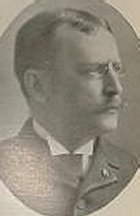
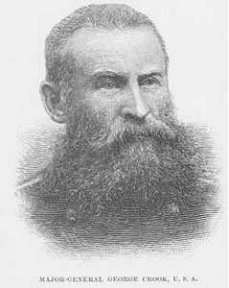
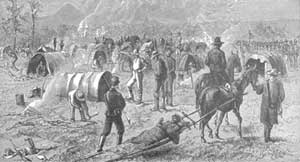
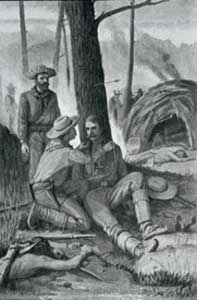
 Rescue
of Miss Gracie ~ page 188
Rescue
of Miss Gracie ~ page 188
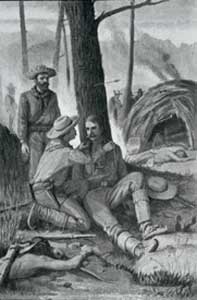 Jack's
Secret ~ pages 308-309
Jack's
Secret ~ pages 308-309
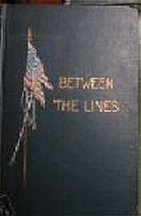
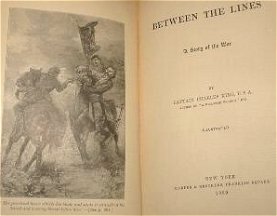

 A Young
Girl ~ page 2
A Young
Girl ~ page 2
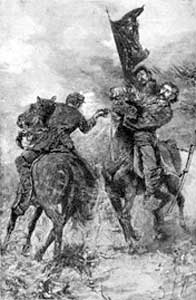 Fierce,
Thrilling Battle ~ page 281
Fierce,
Thrilling Battle ~ page 281
 A
WAR-TIME WOOING ~ (1888) ~ page 7
A
WAR-TIME WOOING ~ (1888) ~ page 7
 THE
IRON BRIGADE ~ (1902) ~ page 222
THE
IRON BRIGADE ~ (1902) ~ page 222
 NORMAN
HOLT: A Story of the Army of the Cumberland ~ (1901) pages 252 - 253
NORMAN
HOLT: A Story of the Army of the Cumberland ~ (1901) pages 252 - 253
